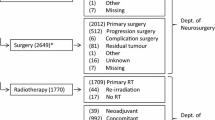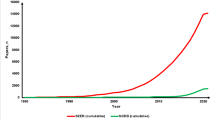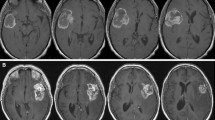Abstract
Objective
Along with the increasing interest in real-world evidence in neuro-oncology, the deficiencies of prior population-based and quality registries became evident. The neuro-oncological quality registries of the NeuroPoint Alliance (NPA) focus on neuro-oncological surgery and stereotactic radiosurgery (SRS) and aim to fill the gaps of neuro-oncological practice in quality surveillance and real-world research.
Methods
Herein, we discuss the historical background, design process, and features of the NPA SRS and Tumor QOD registries. The registries’current status and future directions are outlined.
Results
The NPA SRS and Tumor QOD registries were designed based on the principles of prospective multi-institutional data collection, central auditing for data quality, and focus on patient-reported outcomes (PROs). Currently, the registries include over 4,500 and 2,500 patients each, with caseloads comprising predominantly of brain metastases and primary extra-axial tumors, respectively. The registries serve both as a quality surveillance and improvement tool – providing participating sites with adjusted quality reports – and as platforms for real-world research of observational and, potentially, interventional nature. Future directions of the NPA neuro-oncological registries include the functional communications of the two registries and the incorporation of imaging analyses in the workflow of quality assessment and research efforts.
Conclusions
The NPA SRS and Tumor QOD registries are quality registries of unique granularity in terms of surgical variables and postoperative outcomes. They constitute increasingly valuable data sources for real-time quality surveillance of participating sites and real-world research.



Similar content being viewed by others
References
Coggon D, Inskip H (1994) Is there an epidemic of cancer? BMJ 308(6930):705–708. https://doi.org/10.1136/bmj.308.6930.705
Doll R, Hill AB (1950) Smoking and carcinoma of the lung; preliminary report. Br Med J 2(4682):739–748. https://doi.org/10.1136/bmj.2.4682.739
Wynder EL, Graham EA (1950) Tobacco smoking as a possible etiologic factor in bronchiogenic carcinoma: a study of six hundred and eighty-four proved cases. J Am Med Assoc 143(4):329–336. https://doi.org/10.1001/jama.1950.02910390001001
Bretthauer M et al (2022) Effect of colonoscopy screening on risks of colorectal cancer and related death. N Engl J Med 387(17):1547–1556. https://doi.org/10.1056/NEJMoa2208375
Force UPST (2021) Screening for colorectal cancer: US preventive services task force recommendation statement. JAMA 325(19):1965–1977. https://doi.org/10.1001/jama.2021.6238
Weinhouse S (1972) National cancer Act of 1971–an editorial. Cancer Res 32(4):i–ii
Duggan MA, Anderson WF, Altekruse S, Penberthy L, Sherman ME (2016) The surveillance, epidemiology, and end results (SEER) program and pathology: toward strengthening the critical relationship. Am J Surg Pathol 40(12):e94–e102. https://doi.org/10.1097/pas.0000000000000749
Mallin K et al (2019) Incident cases captured in the national cancer database compared with those in U.S. population based central cancer registries in 2012–2014. Ann Surg Oncol 26(6):1604–1612. https://doi.org/10.1245/s10434-019-07213-1
Shin JY, Diaz AZ (2016) Anaplastic astrocytoma: prognostic factors and survival in 4807 patients with emphasis on receipt and impact of adjuvant therapy. J Neurooncol 129(3):557–565. https://doi.org/10.1007/s11060-016-2210-1
Wang C et al (2017) Overall survival benefit associated with adjuvant radiotherapy in WHO grade II meningioma. Neuro Oncol 19(9):1263–1270. https://doi.org/10.1093/neuonc/nox007
Asher AL et al (2023) Research using the quality outcomes database: accomplishments and future steps toward higher-quality real-world evidence. J Neurosurg 1–19. https://doi.org/10.3171/2023.3.Jns222601
Schnog J-JB, Samson MJ, Gans ROB, Duits AJ (2021) An urgent call to raise the bar in oncology. Br J Cancer 125(11):1477–1485. https://doi.org/10.1038/s41416-021-01495-7
Asher AL et al (2021) Local failure after stereotactic radiosurgery (SRS) for intracranial metastasis: analysis from a cooperative, prospective national registry. J Neurooncol 152(2):299–311. https://doi.org/10.1007/s11060-021-03698-7
Alvi MA et al (2022) Factors associated with progression and mortality among patients undergoing stereotactic radiosurgery for intracranial metastasis: results from a national real-world registry. J Neurosurg 1–14. https://doi.org/10.3171/2021.10.Jns211410
Harris PA, Taylor R, Thielke R, Payne J, Gonzalez N, Conde JG (2009) "Research electronic data capture (REDCap)–a metadata-driven methodology and workflow process for providing translational research informatics support. J Biomed Inform 42(2):377–381. https://doi.org/10.1016/j.jbi.2008.08.010
Sheehan JP, Kavanagh BD, Asher A, Harbaugh RE (2016) Inception of a national multidisciplinary registry for stereotactic radiosurgery. J Neurosurg JNS 124(1):155–162. https://doi.org/10.3171/2015.1.Jns142466
Sheehan JP et al (2019) Quality of life outcomes for brain metastasis patients treated with stereotactic radiosurgery: pre-procedural predictive factors from a prospective national registry. J Neurosurg JNS 131(6):1848–1854. https://doi.org/10.3171/2018.8.Jns181599
Bunevicius A, Lavezzo K, Shabo L, McClure J, Sheehan JP (2021) Quality-of-life trajectories after stereotactic radiosurgery for brain metastases. J Neurosurg JNS 134(6):1791–1799. https://doi.org/10.3171/2020.4.Jns20788
Asher AL et al (2022) Launching the quality outcomes database tumor registry: rationale, development, and pilot data. J Neurosurg 136(2):369–378. https://doi.org/10.3171/2021.1.Jns201115
Michalopoulos GD, Katsos K, Grills IS, Warnick RE, McInerney J, Attia A, Timmerman R, Chang E, Andrews DW, D'Ambrosio AL, Cobb WS, Pouratian N, Spalding AC, Walter K, Jensen RL, Bydon M, Asher AL, Sheehan JP (2023) Stereotactic radiosurgery in the management of non-small cell lung cancer brain metastases: a prospective study using the NeuroPoint Alliance Stereotactic Radiosurgery Registry. J Neurosurg 1–10. https://doi.org/10.3171/2023.8.JNS23308
Ford I, Norrie J (2016) Pragmatic trials. N Engl J Med 375(5):454–463. https://doi.org/10.1056/NEJMra1510059
Mathes T, Buehn S, Prengel P, Pieper D (2018) Registry-based randomized controlled trials merged the strength of randomized controlled trails and observational studies and give rise to more pragmatic trials. J Clin Epidemiol 93:120–127. https://doi.org/10.1016/j.jclinepi.2017.09.017
Funding
The authors have not disclosed any funding.
Author information
Authors and Affiliations
Contributions
J.P.S., M.B., and A.L.A. conceived the idea behind this research. G.D.M. and K.K. wrote the main manuscript text. All authors reviewed the manuscript.
Corresponding author
Ethics declarations
Competing interests
The authors declare no competing interests.
Additional information
Publisher's Note
Springer Nature remains neutral with regard to jurisdictional claims in published maps and institutional affiliations.
Rights and permissions
Springer Nature or its licensor (e.g. a society or other partner) holds exclusive rights to this article under a publishing agreement with the author(s) or other rightsholder(s); author self-archiving of the accepted manuscript version of this article is solely governed by the terms of such publishing agreement and applicable law.
About this article
Cite this article
Sheehan, J.P., Michalopoulos, G.D., Katsos, K. et al. The NeuroPoint alliance SRS & tumor QOD registries. J Neurooncol 166, 257–264 (2024). https://doi.org/10.1007/s11060-023-04553-7
Received:
Accepted:
Published:
Issue Date:
DOI: https://doi.org/10.1007/s11060-023-04553-7




